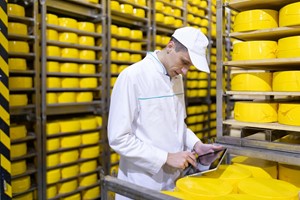In the ongoing battle against food waste and fraud, innovators are turning to artificial intelligence (AI) as a powerful tool to tackle these pressing challenges. At this week's evokeAG conference in Perth, industry leaders are delving into how AI can revolutionize the way we manage food supply chains, ensuring freshness and quality while reducing waste.
Keynote speaker Abi Ramanan, an American Food Systems Entrepreneur, highlighted the transformative potential of AI in the food industry. Ramanan emphasized how AI enables a deeper understanding of food products by providing valuable insights into factors like freshness, ripeness, and tenderness. One key technology making waves is hyperspectral imaging, often described as "fingerprint technology," which scrutinizes everything from avocados to seafood, helping to prevent waste and detect fraud.
In a case study focusing on avocados, cameras installed on production lines scan the fruit, analyzing dry matter content to predict ideal ripeness and suitability for export. This approach allows for a more comprehensive assessment of all products, eliminating the need for sampling and ensuring higher quality standards. Similarly, in a fish market scenario, the same technology exposed fraudulent practices, such as substituting lower-quality tilapia for red snapper in Spain.
Despite these advancements, Ramanan noted that agriculture has yet to fully benefit from the digital explosion, urging wider adoption of AI across the sector. By leveraging AI from the inception of the supply chain, Ramanan envisions a transformed agricultural landscape with enhanced efficiency and sustainability.
Harriet Mellish from Agrifutures emphasized the importance of global collaboration and exchange of ideas to drive AI innovation in agriculture. By bringing together thought leaders and sharing diverse perspectives, the industry can accelerate progress and overcome challenges more effectively.
However, integrating AI into existing supply chain systems poses significant challenges. Identifying the optimal points for AI integration and navigating the financial hurdles associated with low-margin, high-volume operations remain key obstacles. Ramanan acknowledged these economic constraints, recognizing the need for innovative solutions to make AI technology more accessible to all players in the food industry.
Australian Associated Press












